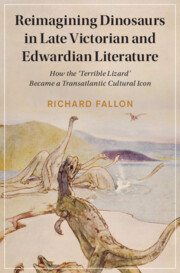 Reimagining Dinosaurs in Late Victorian and Edwardian Literature
Reimagining Dinosaurs in Late Victorian and Edwardian Literature Book contents
- Reimagining Dinosaurs in Late Victorian and Edwardian Literature
- Cambridge Studies in Nineteenth-Century Literature and Culture
- Reimagining Dinosaurs in Late Victorian and Edwardian Literature
- Copyright page
- Contents
- Figures
- Acknowledgements
- Note on Scientific Terminology
- Introduction Dinosaurs in Transition
- Chapter 1 Reclaiming Authority: Henry Neville Hutchinson, Popular Science, and the Construction of the Dinosaur
- Chapter 2 Reinventing Wonderland: Jabberwocks, Grotesque Monsters, and Dinosaurian Maladaptation
- Chapter 3 Rearticulating the Nation: Transatlantic Fiction and the Dinosaurs of Empire
- Chapter 4 Rediscovering Lost Worlds: Arthur Conan Doyle and the Modern Romance of Palaeontology
- Conclusion Dinosaurs Rewritten
- Notes
- Bibliography
- Index
- CAMBRIDGE STUDIES IN NINETEENTH-CENTURY LITERATURE AND CULTURE
Chapter 3 - Rearticulating the Nation: Transatlantic Fiction and the Dinosaurs of Empire
Published online by Cambridge University Press: 28 October 2021
- Reimagining Dinosaurs in Late Victorian and Edwardian Literature
- Cambridge Studies in Nineteenth-Century Literature and Culture
- Reimagining Dinosaurs in Late Victorian and Edwardian Literature
- Copyright page
- Contents
- Figures
- Acknowledgements
- Note on Scientific Terminology
- Introduction Dinosaurs in Transition
- Chapter 1 Reclaiming Authority: Henry Neville Hutchinson, Popular Science, and the Construction of the Dinosaur
- Chapter 2 Reinventing Wonderland: Jabberwocks, Grotesque Monsters, and Dinosaurian Maladaptation
- Chapter 3 Rearticulating the Nation: Transatlantic Fiction and the Dinosaurs of Empire
- Chapter 4 Rediscovering Lost Worlds: Arthur Conan Doyle and the Modern Romance of Palaeontology
- Conclusion Dinosaurs Rewritten
- Notes
- Bibliography
- Index
- CAMBRIDGE STUDIES IN NINETEENTH-CENTURY LITERATURE AND CULTURE
Summary
Chapter 3 examines how transatlantic fiction about dinosaurs shaped notions of national potency at a key moment in US and British history. The first half focuses on two American interstellar romances whose violent protagonists vanquish dinosaurs on evolutionarily backward planets. J. J. Astor’s A Journey in Other Worlds (1894) has them conquering Jupiter’s dinosaurs before heading to a Christianised Saturn and learning about the ‘Anglo-Saxon’ race’s spiritual evolution, while in Gustavus Pope’s Journey to Venus (1895) they subdue prehistoric Venus in an unruly pastiche of palaeontological writing. The chapter’s second half provides alternative perspectives from British authors whose narratives, all published in 1899, allude to the ongoing search for giant dinosaurs in the American West as a way of reflecting on nation, empire, and masculinity. Henry Hering’s short story ‘Silas P. Cornu’s Divining-Rod’ ridicules the avarice of the US tycoons who fuelled the dinosaur ‘rush’, while C. J. Cutcliffe Hyne’s The Lost Continent and Frank Savile’s Beyond the Great South Wall have encounters with giant brontosaurs reinvigorating men’s imperialistic masculinity in over-civilised societies.
Keywords
- Type
- Chapter
- Information
- Reimagining Dinosaurs in Late Victorian and Edwardian LiteratureHow the ‘Terrible Lizard' Became a Transatlantic Cultural Icon, pp. 99 - 135Publisher: Cambridge University PressPrint publication year: 2021


